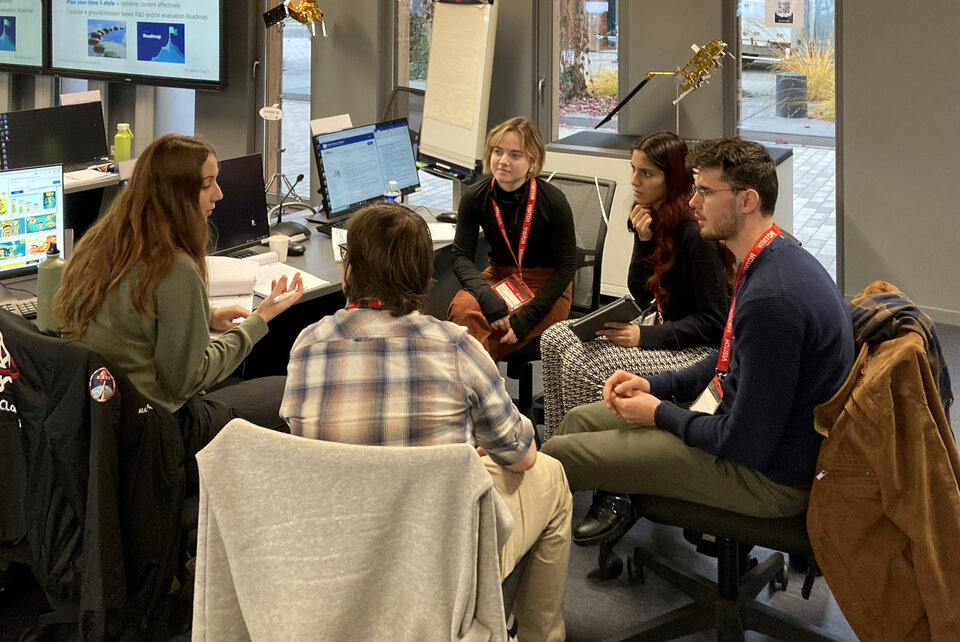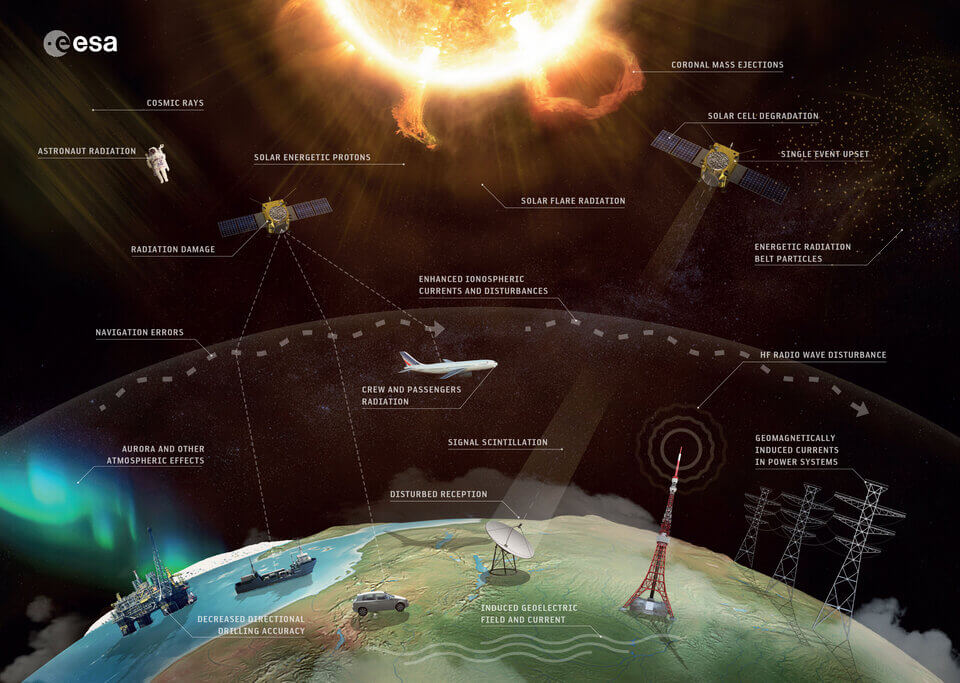In brief
ESA Academy is proud to announce that university students may now apply for the pilot edition of the Space Weather Training Course, to be held from 8 to 12 May 2023 at ESA Academy’s Training and Learning Facility in ESEC-Galaxia, Belgium. This training course has been developed by ESA’s Education and Space Weather Offices.
In-depth
Did you know the weather is not something exclusive to Earth? You do not need an umbrella to shield you from the rain in space, but there are still storms.
In fact, the space environment is affected by solar wind as well as the effects of other solar events, which can significantly impact spacecraft trajectories, satellite electronics, communications, GPS signals, and more. Space weather can disrupt the technology we have become so dependent upon on Earth.
That’s where space weather research comes in: to help us better protect our technology and astronauts in space by understanding the physical processes driving interplanetary and planetary environments, and forecasting and nowcasting the potential impacts on biological and technological systems.
The field of space weather encompasses both the dynamic state of the space environment and its interaction with technologies as diverse as spacecraft hardware on-orbit through to power distribution networks on the ground. Space weather services aim to translate knowledge of space weather phenomena and their potential impacts into actionable information for system operators in the affected sectors.
ESA’s Space Safety Programme Office aims to detect, predict and assess threats from space and their potential risk to life, property, and infrastructure. ESA’s Space Weather Office is addressing those risks associated with the activity of our Sun with the goal of providing owners and operators of critical spaceborne and ground-based infrastructure with timely and accurate information that will enable mitigation of the adverse impacts of space weather.
Training Course Description

ESA intends to provide students with an overview and introduction to the space weather domain from a range of perspectives. This will include scientific and technological fundamentals, space weather monitoring, forecasting, modelling, and understanding of its technological impacts along with an outlook toward the domain’s evolution in the future.
The course will include lectures and hands-on practical work together with toursof key facilities providing an essential part of the current European space weather landscape: ESA’s Space Weather Coordination Centre and the Solar-Terrestrial Centre of Excellence at the Space Pole in Brussels, and both ESA’s Space Weather Data Centre and Proba-2 Operations Centre at ESEC-Redu.
Upon completion of the workshop, students will be evaluated viaa group project and will receive a certificate of participation and course transcript, allowing them to request ECTS credit(s) from their respective universities.
Preliminary schedule
| Day 1 | Introduction to Space Weather: From Physics to Impacts Space Weather Fundamentals I: The Sun and Heliosphere Space Weather Fundamentals II: The Geospace Environment From Physics to Forecasting Group Project session |
| Day 2 | Data Resources for Space Weather Monitoring and Forecasting Space Weather Modelling Space Weather Impact on Spacecraft Operations Space Weather Impact on Space Surveillance and Tracking Space Environment Impacts on Space-based Systems |
| Day 3 | Space Weather Impact on Navigation and Communication Systems Space Weather Impact on Aviation Visit of the Solar-Terrestrial Centre of Excellence and ESA’s Space Weather Coordination Centre |
| Day 4 | Space Weather Impact on Ground-based systems Space Weather Socio-Economic Impacts and the Road to Operational Service Provision in Europe Group Project session |
| Day 5 | Visit of ESEC-Redu Group Project session Group Project presentations Conclusion |
Who can apply?
Applications are open to students enrolled in university who fulfil the following criteria:
- aged minimum 18 years old; ESA Academy and relevant partners will only appraise applications from students who have no or limited professional experience in relevant engineering or space-related topics;
- be a citizen of an eligible state;
- be enrolled as a Master (BSc completed) or Ph.D. student in a university(not graduating before the training course);
- be studying an engineering subject, science, or business administration/communication with a science or engineering background.
Selected students will be requested to attend the entire 5-day training course at ESEC-Galaxia. They will be sponsored by ESA to cover accommodation and meals, as well as up to 300 Euros for travelling to Belgium.
How to apply
- Fill in the application form;
- Upload a motivation letter (PDF, maximum 1 page, no images);
- Upload a CV (PDF, Europass format, maximum 2 pages, no images);
- Upload a formal recommendation letter (PDF, maximum 1 page, including signature, no images) from a university professor or academic supervisor of current university (if it is not possible to receive the recommendation letter from your referee, please ask them to send a recommendation email to [email protected] before the application deadline);
- Upload a copy of your academic records (PDF).
All answers and documents should be in English (except academic records if not available).
The deadline for applications is 13 March 2023 23:59 CEST.
For more information, please contact [email protected].


